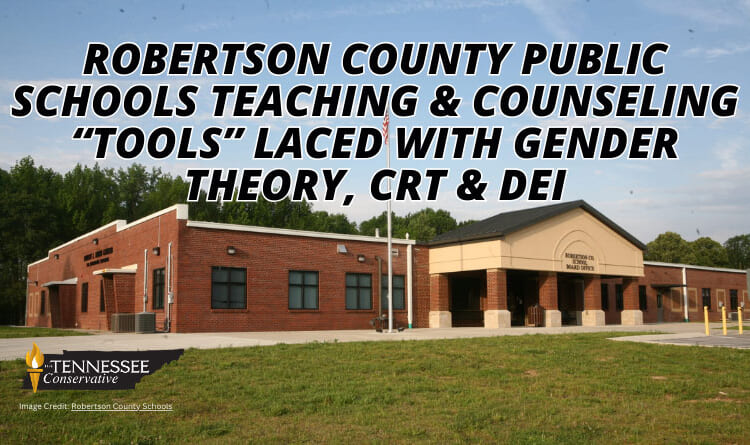Image Credit: Robertson County Schools
The Tennessee Conservative [By Adelia Kirchner] –
A recent public records request for information related to diversity, equity, and inclusion (DEI) trainings and initiatives employed by Robertson County Public Schools since May 1st, 2022, shows that resources utilized by the district are heavily laced with gender theory, critical race theory (CRT) and DEI.
This request was made by a citizen pursuant to the Tennessee Open Records Act.
In response, Robertson County Public Schools provided their curriculum, the Tennessee State Board of Education school counseling standards, various school board policies, as well as Diversity Coordinator emails, poverty simulation information, and information on cultural competency events.
These documents total over 400 pages, but one standout from this public records request is the school district’s “Cultural Competence Self-assessment Checklist.”
Educators are advised to “stay in touch” with their emotions while completing this assessment and to remind themselves that “learning is journey.”
“The term ‘culture’ includes not only culture related to race, ethnicity and ancestry,” the document reads, “but also the culture (e.g. beliefs, common experiences and ways of being in the world) shared by people with characteristics in common, such as people with disabilities, people who are Lesbian, Bisexual, Gay and Transgender (LGBT), people who are deaf, members of faith and spiritual communities, people of various socio-economic classes, etc.”
This self-assessment asks participants to note the frequency with which they “Value Diversity,” “Share [their] culture,” “Check [their] assumptions,” “Act as an ally,” and “Understand the impact of racism, sexism, homophobia…” amongst other things.
Participants are also asked to note the frequency with which they “Acknowledge the importance of difference.” This prompt is expanded upon by the following statement, “I know that differences in colour, culture, ethnicity etc. are important parts of an individual’s identity which they value and so do I. I will not hide behind the claim of ‘colour blindness’.”
Yet another prompt asks participants to note the frequency of which they are “Aware of [their] privilege if [they are] White.” This prompt is expanded on by the following statement, “If I am a White person working with an Aboriginal person or Person of Colour, I understand that I will likely be perceived as a person with power and racial privilege, and that I may not be seen as ‘unbiased’ or as an ally.”
Another standout can be located in the Summer Professional Development materials for school counselors which includes a lengthy presentation on “Working with LGBTQ Students.”
This presentation was put together by Shawn E. Reilly with the Vanderbilt Program for LGBT Health and it differentiates “Sex Assigned at Birth,” from “Legal Sex,” “Gender Identity,” “Gender Expression,” “Sexual & Romantic Orientation” and a whole slew of other terms.
The document goes on to provide diagrams for a “Binary Gender Model” and a “(More) Inclusive Gender Model.”
Counselors are also instructed to ask about and use preferred names and pronouns for transgender individuals.
“When referring to a transgender person, you should always use the name and pronouns the person says they use,” the presentation reads. “Transgender women should NEVER be referred to as male or as men,” and “Transgender men should NEVER be referred to as female or as women.”
The presentation tells counselors that if they misgender an individual and are corrected, they should “quickly apologize or say ‘thank you,’” correct their mistake, and “do not make the mistake again.”
The terms “transvestite,” “hermaphrodite,” and “sex reassignment surgery” are deemed offensive and outdated.
There is also a slide titled “Things to Remember when a Student Comes Out” followed by slides on how to “Demonstrate Understanding and Acceptance,” “Things to Avoid Saying when a Student Comes Out,” “Important Considerations When A Student Discloses,” and a video on how to support non-binary students.
This presentation concludes with several slides on how to be a “trans affirming” counselor and information on Vanderbilt’s Trans Buddy Program and their Program for LGBTQ Health is included.
Some of the additional information provided about Robertson County Schools through this public records request include:
• Details on the activities/communications of the district’s Cultural Competency Committee
• Staff resources shared for Black History Month
• Photos of Hispanic Heritage decorations with socialist imagery, accompanied by a list of socialist/left-leaning “Important Hispanic Achievers”
• “Bias Busters Diversity Quiz” that the Cultural Competency Committee decided to send to all teachers for data collection
• Details on DEI, CRT, and gender theory-related professional development activities conducted by the district
• Details on summer administrator meetings which highlight Kuma Roberts as a “one of a kind DEI keynote speaker”
Access the documents summarized above by clicking here and here.

About the Author: Adelia Kirchner is a Tennessee resident and reporter for the Tennessee Conservative. Currently the host of Subtle Rampage Podcast, she has also worked for the South Dakota State Legislature and interned for Senator Bill Hagerty’s Office in Nashville, Tennessee.
You can reach Adelia at adelia@tennesseeconservativenews.com.














